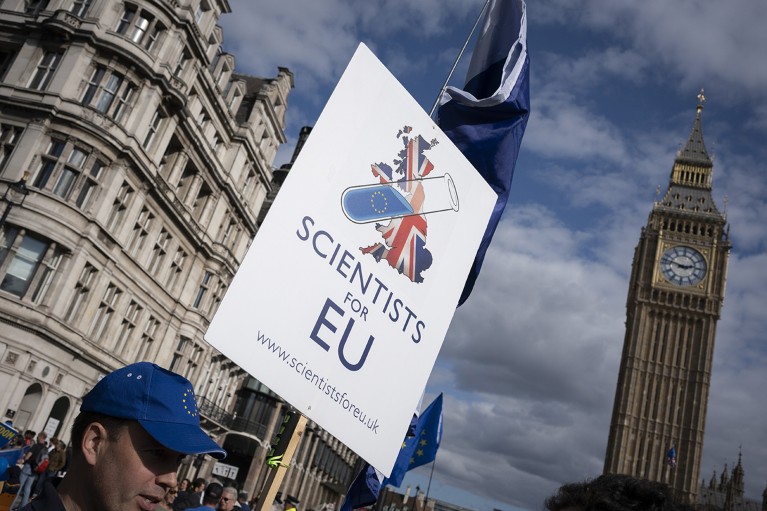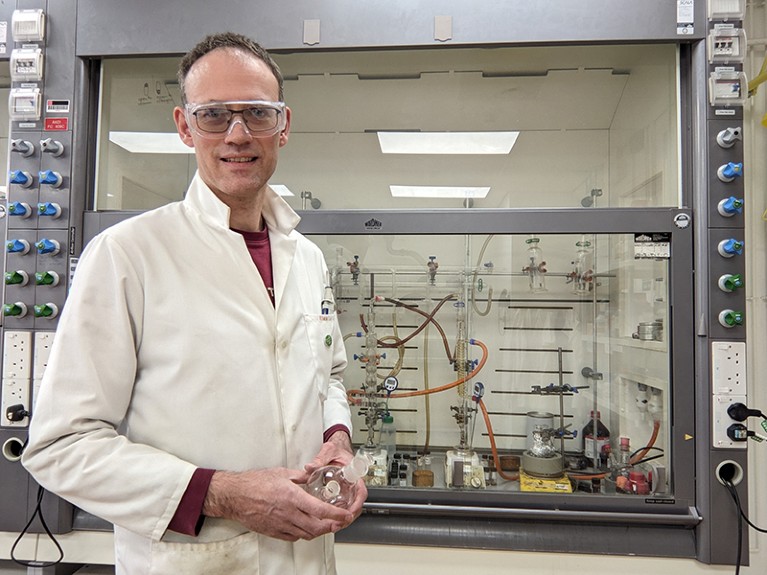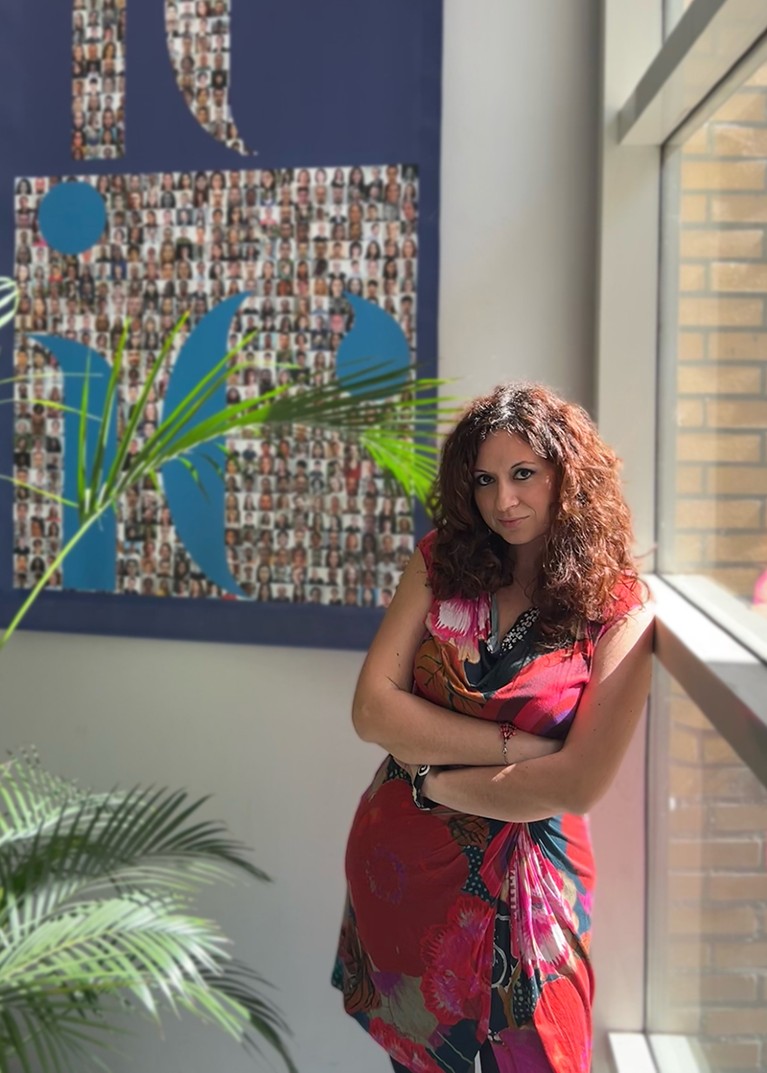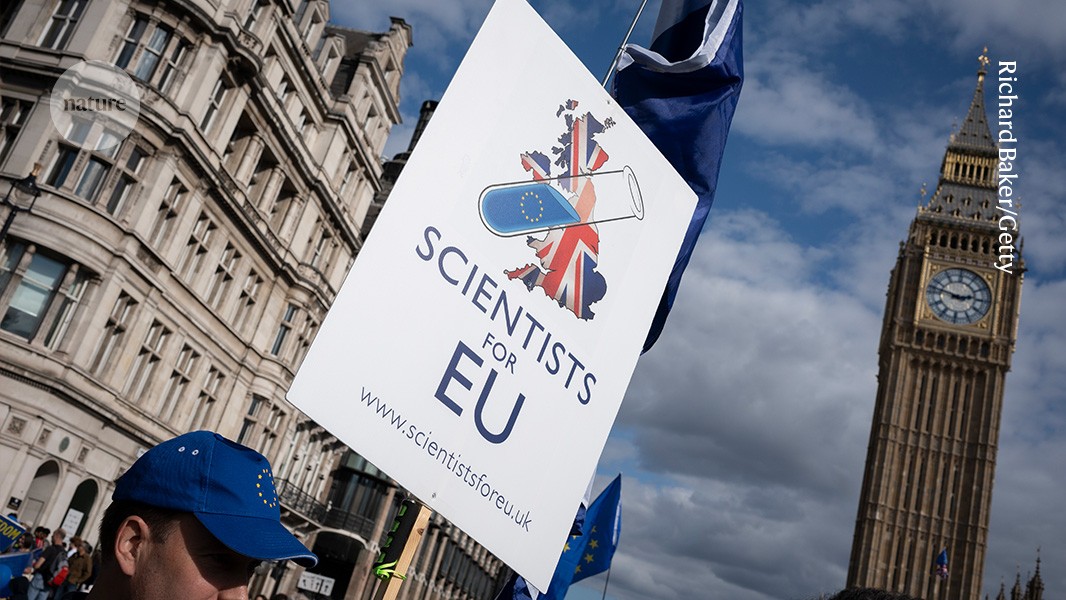
Scientists in the United Kingdom faced uncertainty over funding during the Brexit departure process.Credit: Richard Baker/Getty
The United Kingdom’s exit from the European Union five years ago marked a watershed in a bruising battle to settle the country’s relationship with its closest international neighbours, many citizens of which had moved to the United Kingdom to develop their careers.
But the United Kingdom’s narrow vote to leave the EU in June 2016 meant that UK-based researchers from the bloc’s other 27 member states faced tough career decisions. Many no longer felt comfortable living and working in a country that had suddenly severed a 47-year political and economic relationship, that supported career mobility and freedom of movement, fruitful research collaborations and generous funding opportunities.
When the formal separation came, in 2020, some researchers decided to return to their home nations in mainland Europe or move further afield to develop their careers. Others remained and joined UK-based diaspora-scientist associations, where they became active in promoting common interests affecting scientists across continental Europe and beyond. How do they feel their careers have fared over the past five years?
Nature’s careers team asked three European research-group leaders, who are based either in the United Kingdom or mainland Europe, about their career dilemmas during the Brexit departure process, and whether the fears they had five years ago were realized.
NIEK BUURMA: All was calm, before the waves
Physical organic chemist, Cardiff University, UK.
I moved to the United Kingdom from the Netherlands in 2002 after finishing my PhD at the University of Groningen, for a chemical-biology postdoctoral position at the University of Sheffield. The field was growing a lot in the United Kingdom at that time and my plan was to stay there for three years. I was then offered a lecturer post at Cardiff University in 2006. I’m still here 19 years later.
After the United Kingdom voted to leave the EU in June 2016, triggering the process we now know as Brexit, it felt as if I was not considered part of the country. It made me question many of my choices. My partner is French and our two kids were born and go to school here. They speak Dutch, French and English.
I was afraid of speaking Dutch to them in the street after the vote. I thought, “What if we’re heard by someone who doesn’t want EU immigrants in the UK?”
I was also afraid that Brexit could affect the scientific environment in the United Kingdom and therefore impact my career.
Brexit allowed people to be more openly negative about immigrants, but it affected me less than I feared. On a personal level, nothing changed for me and my family. We live in a part of the country where there are already two official languages, English and Welsh, so it is normal hearing people speaking different languages.

Niek Buurma, a physical organic chemist, feared anti-immigrant sentiment after the United Kingdom voted to leave the European Union.Credit: Niek Buurma
I started my own laboratory in 2006 and between then and 2020 I hosted one or two students from France each year as part of the EU-funded Erasmus+ exchange programme, which allows students at EU universities to spend up to a year studying or working in other member states. (In 2018, more than 10,000 UK students took part in the programme by studying at institutions in other EU countries, and almost 30,000 EU students came to the United Kingdom.)
The United Kingdom opted out of the programme in 2020, so the natural link that we had with European universities through the programme is now completely broken.
Also, a few of my collaborations started with preliminary work in a friend’s lab during holidays in the Netherlands. I just needed to inform my institution if I was going to work there. But now I might need to seek formal permission from my employer before working abroad. It’s a further level of paperwork to prepare. If you already have an established relationship, you find a way to make it work. But building new collaborations is now more complicated.
From a recruitment perspective, most research projects need someone with specific expertise and interests. As a physical organic chemist, I tend to look for people who really enjoy both organic synthesis and mathematics, and that’s a rare combination.
The drop in the number of EU researchers moving to the United Kingdom since the Brexit vote took place means that there is a smaller pool of applicants.
Now, when we advertise for a PhD student position, often the advice is to try to recruit UK-based people because we can never be 100% sure about being able to sponsor the visa for an overseas candidate. Last year, I had to re-advertise a PhD studentship three times. None of the applicants had the required characteristics. Before Brexit, the potential pool of suitable applicants would have been from across the entire EU.
Things are better now, but there remains an underlying fear that Brexit will result in a slow but definite separation between the EU and the United Kingdom.
The multitude of small barriers to effective research that have been introduced by Brexit can all be navigated. But more time and energy needs to be invested to develop a research collaboration. And even if UK-based researchers are willing to invest the energy and time, are their potential collaborators in the EU also willing to do so? Or might they consider an easier collaboration with someone else who is based in the EU instead?
At some point, a future UK government might decide that it’s no longer worth paying to be associated with European funding schemes. For example, not being associated with Horizon Europe — the European Union’s research and innovation funding programme (see ‘Deal or no deal’) — would be a big (and detrimental) hit.
For me, Brexit highlighted the need for scientists to speak out about European Union ideals and more generally on the influence that political decisions can have on science. I regret my lack of action before the vote. I think academics should have made it clearer how leaving the EU was going to affect the scientific sector. After the Brexit vote, I got involved with the Dutch embassy in London to establish the Dutch Academic Network in the UK. Working with them made me feel part of something bigger.
Together with the other diaspora scientists’ associations, we realized the value of having a larger group to represent the interests of researchers. That kind of critical mass helped us in making our voices heard.
In 2022, these diaspora groups came together in the CONNECTS–UK project, in which we collected the experiences of scientists and shared them with scientific attachés, members of the EU Parliament and UK Parliament.
A practical example is the loss of specific funding that the EU gives to less economically developed areas of a member state (Wales is one example), which the United Kingdom cannot access anymore.
What I’m really worried about is that, over time, all those little limitations will affect future generations of scientists in the United Kingdom and inevitably reduce collaborations between the EU and the United Kingdom. Like a tsunami, all was calm, and then suddenly the waves came.
DIANA PASSARO: An escape route to Paris
Leukaemia researcher, Cochin Institute, Paris.
It’s important for early-career researchers to work in different environments — hence my move from Italy, my home country, in 2009, to do a PhD in oncology and cancer biology at the University of Paris Cité.
I was happy there but wanted to go to an English-speaking city to progress in my career. New York and London were my top choices, so it was great to land a four-year postdoc in London in 2015, working in Dominique Bonnet’s cancer research lab at the Francis Crick Institute.
London had plenty of career opportunities for my husband, a computational neuroscientist, who secured a postdoc position at King’s College London.
But then, in 2016, everything changed. The Brexit vote, for me, was an end to the certainties provided by the EU: freedom of movement and the possibility to establish my life and career wherever I wanted. Also, the freedom to apply for European grants.

Leukaemia researcher Diana Passaro says she wouldn’t have left the United Kingdom if the country hadn’t voted to leave the European Union.
At the time, I was pregnant and felt anxious about not being British, which might have made a mortgage application more difficult, and perhaps having to wait longer before I could apply for citizenship. I was also worried that my children might not have the right to stay in the country where they were born.
Despite the economic uncertainties, I embarked on a fellowship provided by the Crick that enables young researchers to transition towards becoming a principal investigator (PI).
As a new group leader, you don’t have much money or power to attract talent, and I realized that in the United Kingdom my career progression could became more difficult because of what was happening.
I returned to Paris in 2019 and established an international lab at the Cochin Institute. I now have people from France, Italy, Africa, Indonesia, Brazil and Ireland. Working with people from various backgrounds enriches our science.
I rely significantly on students’ help. Erasmus+ students or interns can help a project to succeed. By contrast, most of my lab-leader colleagues in the United Kingdom say they struggle to find people from abroad and of course cannot count on Erasmus+ students anymore.
The visa application process to bring PhD students to the United Kingdom is now long and expensive. Often, applicants prefer to go elsewhere. This means wasting time and resources, which are precious when you start your career.
Paris provided an escape route for me after Brexit. Here, I found everything I needed and all the support to grow my career. I am happy here and don’t regret my choice.
But my husband found it much harder to leave the United Kingdom. His background is deeply multidisciplinary. In London, this was an asset, but here in Paris he found it difficult to land a PI position.
In the end, he decided to leave academia and now works as a neuroscientist at a scientific company in Paris.
He is happy in his current job, although we often wonder whether things would have worked out differently if we had stayed in the United Kingdom. If it wasn’t for the vote, we wouldn’t have left.


